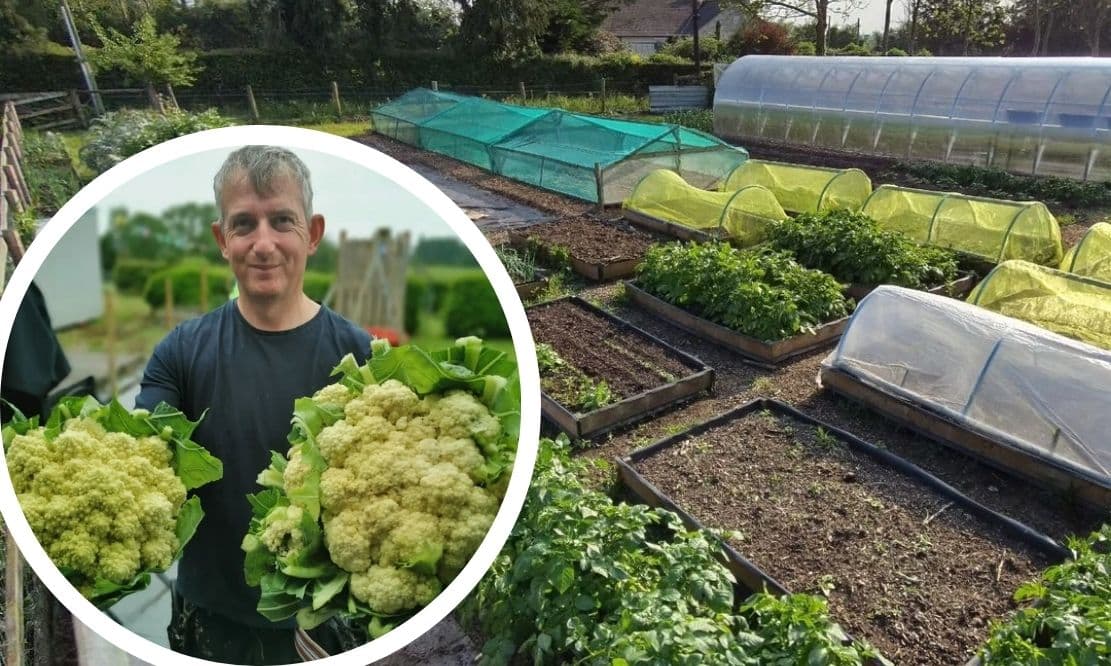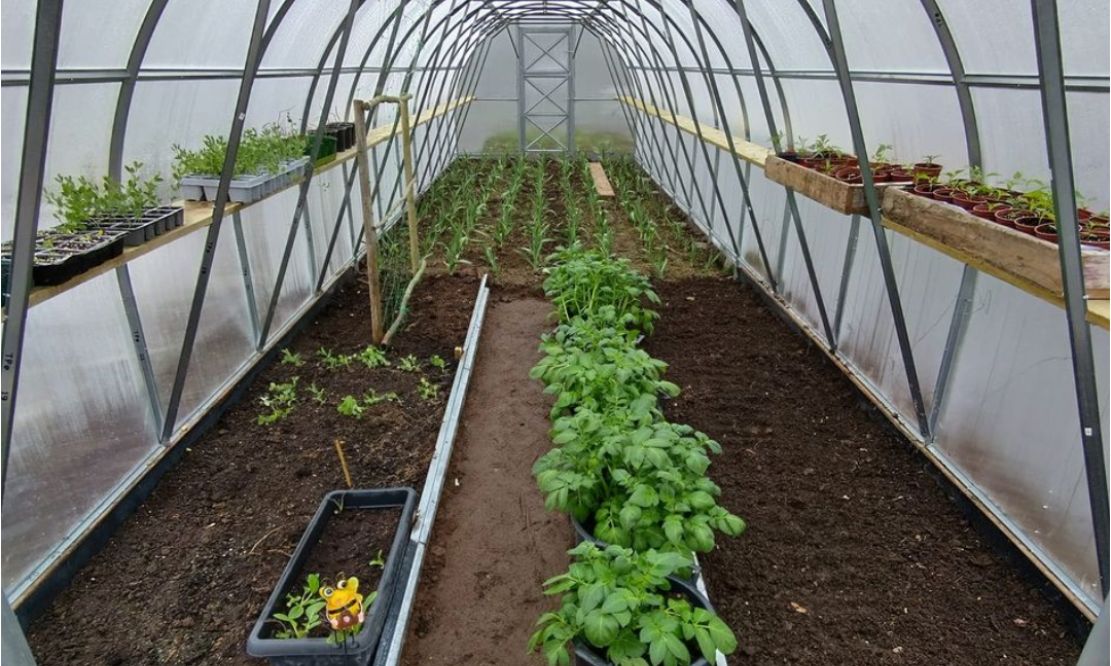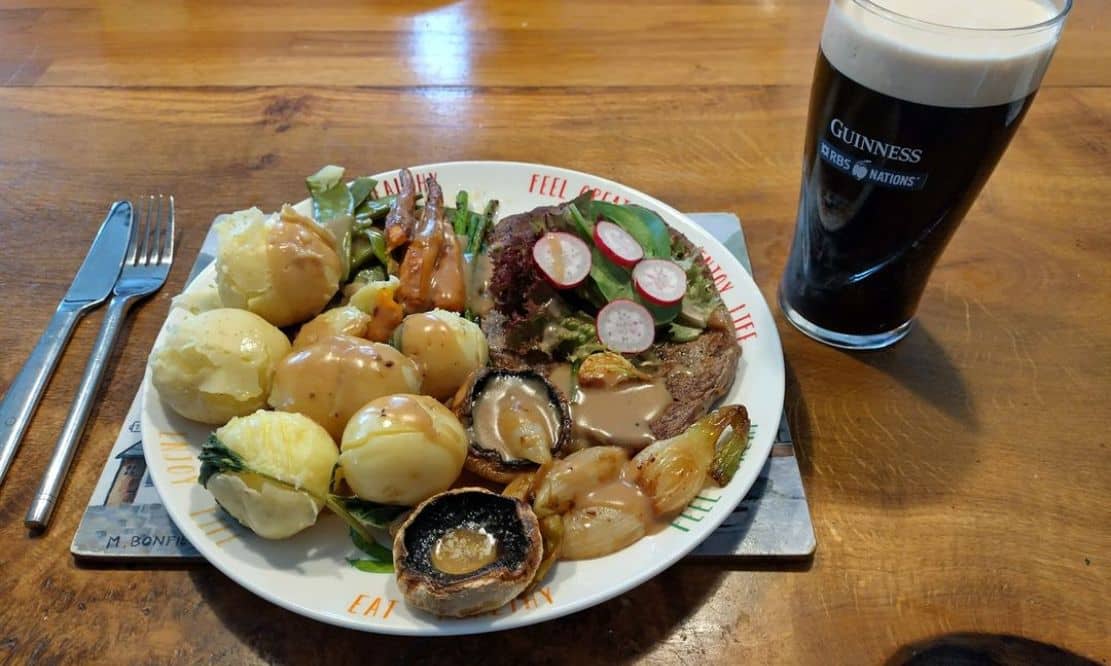
A higher education construction lecturer has returned to his roots, creating a fully self-sustainable allotment around his home near Blackwatertown – and he’s keen to sow a few seeds of wisdom to help allotment life flourish in Armagh.
After spending a number of years in Bromley, London, Daniel Hughes returned to his homestead six years ago with greener fingers than he left with.
Daniel and his family are now completely self-sufficient in vegetables, all year round, thanks to a large vegetable patch, greenhouse, polytunnel and a small orchard.
To date, he and his wife, Edit, have planted around 150 different varieties of fruit trees and bushes bearing everything from the common apple and pear, to the more exotic, with figs, hardy kiwi and Japanese bitter oranges.
While he says his parents’ vegetable patch had ‘triggered’ an interest in homegrown produce at a young age he hadn’t really dug into the nitty gritty of allotment life until his time in England.
Speaking to Armagh I, Daniel explained: “I think mainly childhood experiences gave me an interest. My parents had a veg patch on the farm and I would help out on that.
“I also spent summers on my auntie’s farm, who had a veg patch too and grew tomatoes in the greenhouse. It was very unusual to see in the 80s.”
When Daniel was still living in London, he had his first child and began growing vegetables in the back garden on a four by eight foot raised bed with some additional grow bags on the shed roof.

Daniel’s partly planted polytunnel in April
“I felt it was important for the kids to understand where food comes from and encourage them to eat healthy. The back garden was very quickly completing taken over,” said Daniel.
“Following that, I started helping out on an allotment at Halls Farm Allotments in Bromley and became joint tenant; then I acquired another two plots of my own.
“It was my escape from the city, between the golf course and the railway tracks and a place where my son had more freedom.”
Their quiet place of retreat soon gained recognition, and father and son picked up several shiny accolades, as the fruits of their labour.
Said Daniel: “I won a few awards including gold for best beginners’ allotment in the borough of Bromley. I also won the Community Cup, voted by my fellow allotment holders, and the Committee Shield.
“My son also won the largest pumpkin competition two years in a row!”
However, the real work began when the family returned to the outskirts of the Orchard City, laying the foundations for their dream vegetable garden during the COVID Pandemic.
Finding time during lockdowns was easy. They poured their all into getting it right; reading and researching to ensure they made the most of their space and time. However, Daniel admits there was also a fair amount of trial and error.
But, it’s the experimentation that keeps him keen and the list of species to sow is now growing almost as quickly as the crops.
He added: “We grow just about everything that will grow in our climate. My idea was to surround our home with lots of edible varieties. Tomatoes are my favourite to grow, due to all the different varieties with about 15 types grown last year.”
Daniel’s wife has also found her own way of experimenting with the produce, creating all manner of chutneys, jams, pickles and preserves in house. Nothing is wasted. Everything harvested is stored for use later. Even the off-cuts or unsuitables become fodder for their chickens.

A hearty plate of homegrown food made with Daniel’s own potatoes, mangetout, carrots, onions, garlic scapes, radish, lettuce, bok choy, rosemary and mint
A keen advocate for the homegrown way of life, Daniel believes that many have lost their connection with food and where it comes from.
He is keen to see more people sowing the space they have and plans to help beginner growers on their way with some weekend courses in self-sufficiency.
But, if you want to make it in the nick of time to see some produce on your doorstep this season Daniel has provided a few top benefits and top tips for beginner growers:
Benefits:
– I personally enjoy the planning process each winter in front of the fire, choosing what to plant where and what new things to grow and researching how.
– Encouraging the kids to eat healthy. None of the peas make it into the house as my daughter picks them and eats them straight off the plant.
– Good exercise.
– Homegrown tastes much better.
– Good for your mental health.
– Getting out in the fresh air.
– Organic food, free of pesticides.
– Low food miles. (If you want to help the planet don’t buy an electric car, start to grow your own)
– Food security. COVID demonstrated how much we depend on supermarkets.
– Cost savings (If you do it right).
– Attracts lots of wildlife.
Advice for new growers:
– Start small: I started with an 8 x 4 foot raised bed. You can grow in containers and grow bags too. I have seen lots of people start and quit allotments after investing lots on time and money into their plots.
– Get a good book, join online formers for advice: There is a big online community with lots of experience growers always ready to offer advice.
– Create a balanced eco system: Avoid using chemicals. Create areas for beneficial insects, use companion planting, physical barriers, and organic forms of pest control.
– Don’t sow everything in spring for harvest in autumn. This will leave you with an abundance of food that will get wasted. Lots of veg can be sown to overwinter, like leeks, garlic, sprouting broccoli, sprouts etc. These will all sit out happily over winter.
– Perennial veg are also good for early spring crops. Extend the season each end with cloches and covers for cold nights. Aim to have an all year-round supply.
– Keep costs down: Reuse and recycle what you can, make your own compost and start plants from seed.
– Plan for storage: this is key.
– Don’t sow more than you can look after: I do all my other jobs first before sowing anything new. (If you don’t have time to sow it, you don’t have time to look after it).
– Get the family involved.
– Don’t be disheartened by one failed crop: It happens to the best of us, every year is a learning year.
– Keep on top of weeding: mulching and laying cardboard can reduce weeding significantly. Also practicing no dig gardening when possible.
– Good trouble free crops to start with: salad leaves, radish, scallions, carrots, early or salad potatoes, beetroot, herbs, peas, dwarf French beans and runner beans.





